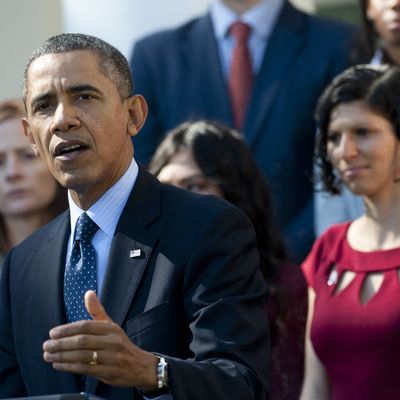
It is hard to say right now just how large a problem the failure of healthcare.gov will ultimately be. The scope of the failure shocked high-level administration officials, and their shock, in turn, makes it impossible to accept at face value their assurances that the site will be working within weeks. The worst-case scenario is that the site remains maddening for months, driving away all but the most committed customers, who will also be the sickest, which would trigger an actuarial death spiral in the exchanges. More likely, Obamcare will muddle through, through a combination of improvements to the website and redirecting customers to phone lines and other old-fashioned sign-up methods. Website failures could be the equivalent of the first signs of the Iraq insurgency. More likely, it will be forgotten as completely as the chaos that followed the opening of Medicare and Medicare Part D.
The coverage of the Obamacare website debacle is a helpful illustration of the epistemic imbalance between left and right that I described in my print story about the health-care wars. If you have followed Obamacare through conservative media, you have imbibed a story of failure after failure. The law began as an infuriating assault on liberty and has only gotten worse since, stitching together a seamless procession of pseudo facts from the appearance of death panels to Warren Buffett’s shocking, completely imaginary endorsement of repeal.
Liberal journalists have covered the positive and negative aspects of the law in a way that, if not impartial — they share the goal of helping the poor and sick get access to medical care — is certainly rigorous and fair. Jonathan Cohn noted back in May that the website might not work as the administration had hoped; Ezra Klein calls the launch a “failure.”
Only the negative liberal coverage has pierced the conservative information bubble, as evidence that even die-hard Obamacare lovers recognize the law is failing. It would be nice if these kinds of admissions against interest persuaded conservatives that liberal journalists are not the mirror image of their own hack pundits but informed policy reporters whose analysis is worth listening to in its totality. Instead it has roughly the opposite effect. Klein’s blunt assessment ricocheted around the conservative new world, undergoing wild exaggeration, and embedding itself in the Republican mind as a Buffettesque pseudo-fact:
Rep John Fleming (R-LA) [said] “the biggest threat to America today is not shutdowns, it’s Obamacare.” He said that it was clear that it would be a disaster and cited liberal pundit Ezra Klein of the Washington Post, who he claimed shared his views.
The imbalance in honesty has magnified the impact of bad Obamacare news and blunted the impact of good Obamacare news. And to date, the good Obamacare news seems to be much more significant. Rapidly falling medical inflation suggests that the law’s pay-for-quality reforms may work, perhaps much better than expected. The cost of insurance plans on the exchanges has also come in well under forecast, likewise implying positive things about the success of the markets. Those developments ultimately matter much, much more than the initial success of the website.
Still, it is true: The website has been an unmitigated fiasco. And complex plans tend to need all their parts to function correctly, not just some of them. The trouble is that the website failure is likely to dominate many Americans’ impression of the law even if the administration manages to repair it.






























